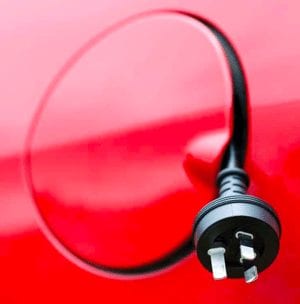One of the few (albeit unintentional) incentives for the early adoption of electric vehicles in Australia – avoiding the exorbitant cost of petrol – looks set to be at least partially removed, in a federal government review of how revenue is raised for Australia’s roads.
In an interview with ABC News on Thursday morning, federal minister for major projects, Paul Fletcher, flagged the federal government’s plan to reform the way Australian drivers are taxed to pay for the upkeep and development of roads, with a particular view to scrapping the $10 billion annual fuel excise.

The idea – and it’s a long-term view; part of the federal government’s 15-year infrastructure plan announced on Thursday – is to dump the fuel tax and instead charge motorists a “road user” fee, based on how far they travel and the level of congestion on their routes.
But the interesting part is Fletcher’s reasoning for this: One of the problems with the fuel tax, he argues, is that it just isn’t fair to all motorists.
“If you’re driving a 10-year-old Commodore, you’re paying through the fuel excise system the equivalent of 4.5c a kilometre, if you’re driving a Prius it’s about 1.5c a kilometre, if you’re driving a completely electric Tesla you’re not paying anything.
“So one of the issues is fairness,” he said.
It’s an interesting perspective, in light of the fact that Australia has one of the slowest growing electric vehicle markets in OECD – a state of play owing almost entirely to the distinct lack of any sort of national policy framework to support or incentivise the uptake of electric vehicles.
It is also a rather dishonest claim. The real motivation for the government scrapping the fuel excise is its need to maintain revenue to build and fix roads as vehicles become more fuel efficient and eventually move away from petrol and diesel altogether.
Which brings us back to the lack of policies supporting the above transition, and the resulting snail’s pace of EV uptake in Australia, compared to other countries like Norway, which offer tax exemptions for EVs precisely because they don’t use petrol – helping to make it the top EV market per capita.
Australia’s EV policy vacuum, meanwhile, was addressed in April by ClimateWorks, who convened an industry-led appeal to the federal government to, among other things, factor in the value of the broader benefits of EVs to human health, air quality, fuel security, energy productivity and electricity supply in any future regulatory reform.
“The lack of a national policy framework in Australia has led to limited overall support and incentives in comparison to our global peers, which has contributed to our poor ranking among major OECD countries for the energy efficiency of our transport sector,” the report said.
“While there is recognition of the short term nature of some recommendations, they are derived from global ‘best practice’ vehicle electrification strategies aimed at near term uptake and support, to ensure Australia is ready for enhanced uptake of EVs in order to meet our climate, energy productivity and air quality goals.”










